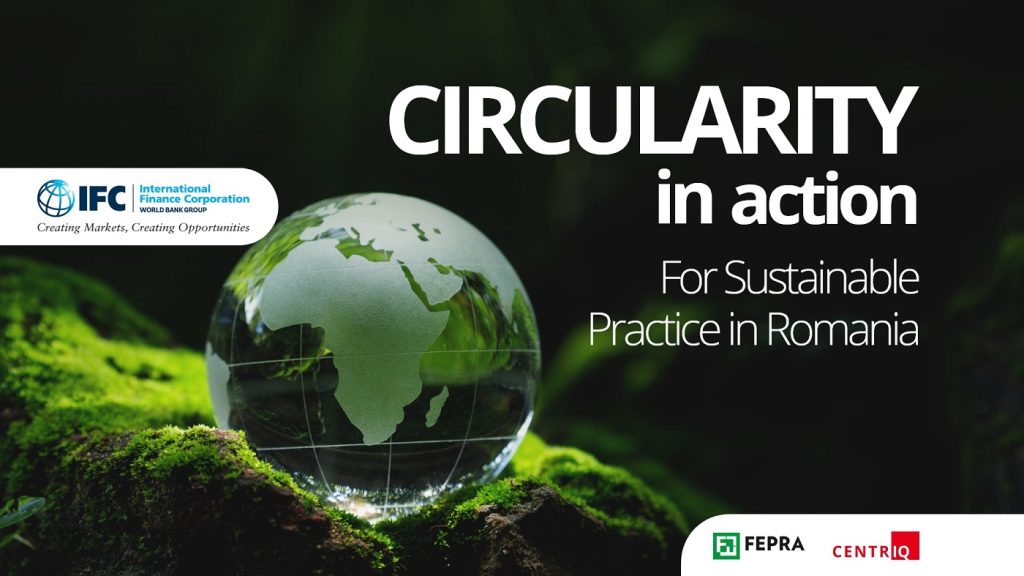:quality(80)/business-review.eu/wp-content/uploads/2023/08/Cristian-Nacu.jpg)
The International Finance Corporation (IFC), a member of the World Bank, is the largest private sector-focused global development institution. The IFC’s goal is to improve the lives of people in developing countries by investing in the growth of private business. For over 60 years, IFC has been working towards a future that is inclusive, provides sustainable growth, and empowers people to achieve their goals. Today, IFC is fuelling the transition to the circular economy, as it provides advisory support for sustainable growth and development. Business Review talked to Cristian Nacu, Senior Country Officer Romania at the IFC, to find out more about the organisation’s upcoming circular economy projects.
Business Review: How can the IFC’s extensive expertise in circular economy transitions support sustainable projects and investments in Romania?
Cristian Nacu: The IFC’s role extends beyond financial capacities, as it offers advisory support to foster sustainable growth for developing countries. As Romania’s evolving Circular Economy landscape presents both challenges and opportunities, the IFC’s expertise plays a pivotal role in guiding initiatives promoting resource efficiency and environmental sustainability while aligning with EU Directives and Standards.
What are the benefits of Romania’s adoption of EU directives and regulations regarding the circular economy?
Adopting these EU directives is not optional; it is mandatory and it has the positive effect of enhancing Romania’s global positioning in sustainable practices. Aligning with these regulations fosters harmonisation with European partners, facilitates trade and cooperation, and stimulates investments in innovative technologies and practices, driving economic growth and job creation.
How does the IFC assist Romania in its implementation of these circular economy directives and standards?
Romania’s circular economy indicators underscore significant potential for enhancement. The IFC’s strategic advisory role aims to optimise the benefits generated by EU directives. For example, “Circularity in Action” is an IFC-endorsed initiative being carried out from May to November 2023, reflecting the IFC’s active engagement in steering Romania’s circular economy journey. The project aligns with the government’s National Circular Economy Strategy (NCES) and Circular Economy Action Plan (CEAP) objectives. “Circularity in Action” fosters communication, collaboration, and co-creation among sector experts and leaders. Industry associations and influential stakeholders contribute to addressing circular economy challenges. Consultations with over 70 companies in priority sectors and workshops represent a solid foundation for practical recommendations.
What role does the private sector play in turning the National Circular Economy Strategy (NCES) and Circular Economy Action Plan (CEAP) into reality in Romania?
The circular economy concept introduces innovative business models and cross-sector collaboration. Transvertical approaches in water management, energy efficiency, and waste management are vital for circular economy practices. And the private sector, which has been a driver of Romania’s development for decades, remains crucial in NCES and CEAP implementation.
As you engage in the project, how do you perceive the current investment landscape in Romania’s circular economy?
The investment landscape in Romania’s circular economy is evolving, reflecting both opportunities and challenges. Companies operating in this field exhibit varying levels of familiarity with circular economy concepts and practices, contributing to differences in industry maturity. The demand and supply dynamics of circular economy investments are influenced by multiple factors, including the need for robust business models that balance profitability and sustainability goals.
Challenges arise due to the fundamental shift from linear to circular business models, necessitating changes in supply chains, product design, and consumer behaviour. Transitioning to circular practices may require upfront investments in innovative technologies, waste management infrastructure, and process re-engineering.
How important is the government’s commitment on circular economy?
The government’s commitment is pivotal for implementing circular economy initiatives on a national scale, as robust policies and regulations set the foundation for coherent and coordinated action. Circular economy requires integrated efforts to shift from a linear to a circular model and to that end, the government’s involvement facilitates industry participation, resource optimisation, and sustainable economic growth.
Romania has vast resources, but are they a good fit for a circular economy?
Romania’s abundant resources offer a valuable foundation for circular economy practices. The project’s consultations with over 70 companies across priority sectors highlight the feasibility of resource transformation. “Circularity in Action” aims to harness these resources to drive circular practices and foster sustainable economic growth.
What is your vision on Romania’s circular economy future?
The country’s future holds the promise of sustainable economic growth and environmental stewardship. Circular practices can position Romania as a leader in resource efficiency and waste reduction and cross-sector collaborations will drive innovative solutions and create a resilient, circular economy ecosystem.
How does the IFC envision the future impact of circular economy principles in Romania and what is the larger significance of projects like “Circularity in Action?”
The circular economy has the potential to drive economic growth, create jobs, and mitigate environmental impact. The IFC envisions a future for Romania where circular economy principles are deeply integrated into economic and environmental practices.
Cristian Nacu
Cristian Nacu is the Senior Country Officer Romania at the International Finance Corporation, the investment arm of the World Bank, with over 25 years of experience in private equity, banking investments, and privatisation. For 10 years, he was a partner at Enterprise Investors, a prominent private equity firm in Central and Eastern Europe, where he also led the company’s representation in Romania. Prior to that, he worked for over 6 years as an investment specialist at the International Finance Corporation within the World Bank Group, and for two years as an executive director at the State Property Fund, the former government privatisation agency. He is also active in numerous nonprofit organisations and has a degree from the Politehnica University of Bucharest.




:quality(80)/business-review.eu/wp-content/uploads/2024/06/EGGER-Radauti.jpg)



:quality(80)/business-review.eu/wp-content/uploads/2024/06/22C0420_006.jpg)

:quality(80)/business-review.eu/wp-content/uploads/2024/06/COVER-1-4.jpg)



:quality(50)/business-review.eu/wp-content/uploads/2024/05/Ines-Rocha-2.jpg)
:quality(50)/business-review.eu/wp-content/uploads/2024/04/38746f52-1b44-4895-8097-83d6a104dc72.jpeg)
:quality(50)/business-review.eu/wp-content/uploads/2016/12/european-investments-bank.jpg)
:quality(80)/business-review.eu/wp-content/uploads/2024/06/br-june-2.jpg)
:quality(50)/business-review.eu/wp-content/uploads/2024/07/VGP-Park-Timisoara_-8thbuilding_iulie-24.jpg)
:quality(50)/business-review.eu/wp-content/uploads/2024/07/America-House-Offices-Bucharest-Fortim-Trusted-Advisors.jpg)
:quality(50)/business-review.eu/wp-content/uploads/2024/07/BeFunky-collage-33-scaled.jpg)